Is this a dangerous path? A huge breakthrough might transform the lives of those with certain blood disorders. But some worry about the medical and moral side effects.
UK gene therapy at £1.6m per patient
 Historic: NHS patients will be among the first in the world to be treated with gene-editing therapy. This new technique involves using tiny scissors (above) to remove sections of DNA.
Historic: NHS patients will be among the first in the world to be treated with gene-editing therapy. This new technique involves using tiny scissors (above) to remove sections of DNA. Glossary
Disease - An illness or sickness.
NHS - The National Health Service, the publicly funded healthcare system in the UK. The NHS was founded in 1948.
Gene - A gene is the basic unit of heredity.
CRISPR - CRISPR-Cas9 allows scientists to remove, add or alter sections of DNA with ease and simplicity.
DNA - Deoxyribonucleic acid is the material in an organism that carries genetic information.
Stem cells - Unspecialised cells that have the ability to develop into different types of cell.
Clinical trials - Studies by experts that test whether a new medicine or treatment works and is safe.
Significantly - Greatly or very importantly.
Eugenics - The idea that human beings should be improved through genetic engineering. In the past, eugenics has generally involved killing people who are deemed “inferior”.
tamper - to make changes that you shouldn't be making
